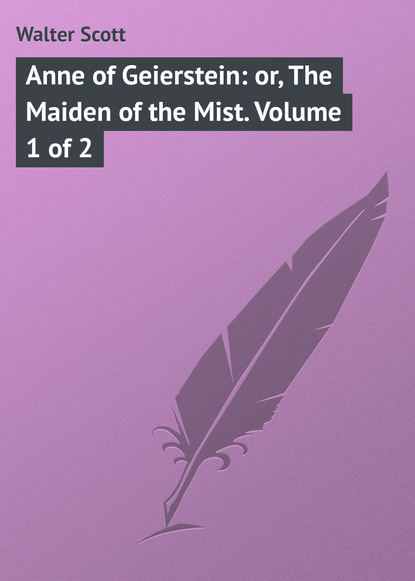 Полная версия
Полная версияПолная версия:
Anne of Geierstein: or, The Maiden of the Mist. Volume 1 of 2
"All the judges, along with Hermann d'Eptingen, mounted on horseback; in the midst of them walked Peter de Hagenbach between two priests. It was night, and they marched by the light of torches; an immense crowd pressed around this sad procession. The prisoner conversed with his confessor, with pious, collected, and firm demeanour, recommending himself to the prayers of the spectators. On arriving at a meadow without the gate of the town, he mounted the scaffold with a firm step, and elevating his voice, exclaimed: —
"'I fear not death, I have always expected it; not, indeed, in this manner, but with arms in my hand. I regret alone the blood which mine will cause to be shed; my lord will not permit this day to pass unavenged. I regret neither my life nor body. I was a man – pray for me!' He conversed an instant more with his confessor, presented his head, and received the blow." – M. de Barante, tom. x. p. 197.
GLOSSARYAbye, to pay the penalty of, to atone for.
Aigrette, a plume of feathers.
Alembic, an old chemical apparatus or vessel, used for distilling.
Astucious, astute, shrewd, cunning.
Baaren-hauter, a nickname for a German private soldier.
Ban-dog, a large fierce dog.
Banneret, a standard-bearer.
Banquette, the walk behind the parapet of a fortress.
Barbican, the outwork defending the gate of a fortress.
Bartizan, a small overhanging turret or projecting parapet.
Brache, a kind of sporting dog.
Braggadocio, a blusterer, a boaster.
Caftan, a long robe worn by men in the East.
"Cour plénière," in ancient French history a gathering of all a king's vassals.
Cresset, a large kind of candlestick for holding a small fire or illuminant.
Dalmatic, dalmatique, a long ecclesiastical robe.
Diet, the national assembly.
Doomsmen, all who gathered at the doom, or great popular court of the ancient Scandinavians.
Dorf, a village.
Double-ganger, Doppelgänger, a spectral counterpart of a living person.
Earth-shoot, a landslip.
Emprise, feat, enterprise.
Espadon, a long heavy sword.
"Fain, to make one," to please, to give pleasure or joy to.
Faustrecht, the right claimed by the petty barons of the Empire to wage private warfare.
Folter-kammer, a torture-chamber.
Gammon, a smoked ham.
Gauds, trinkets, ornaments.
Gear, business, affair; property.
Geierstein, vulture-stone.
Graffs-lust, the count's delight.
Hauberk, a shirt of mail.
Hauptman, a captain.
Hundred, an old subdivision of the English counties.
Kreutzer, a German copper coin, worth one third of a penny English.
Lammer-geier, the bearded vulture.
Landamman, the chief magistrate in a Swiss canton.
Landvogt, a bailiff.
Lanzknecht, a German mercenary soldier.
Largesse, a free distribution of money.
Leaguer, a camp.
Losel, a slothful person.
Lyme-hound, a large dog.
"Maen Gorsedd," the stone of the British bards.
Mail, a trunk.
Mainour, a thing stolen, discovered in the hands of the thief.
Malecredence, mistrust.
Merlin, a kind of hawk, formerly trained to hunt game birds.
Minnesinger, a poet-minstrel of mediæval Germany.
Montero-cap, a horseman's scarlet cap of fine Spanish cloth trimmed with fur.
Morisco, a Moor of Spain.
Palmer, a pilgrim to the Holy Land.
"Par amours," forbidden love.
Partisan, a kind of pike or halberd.
Peltry, skins and furs of wild animals.
Pight, pitched, placed, fixed.
Ptisan, a decoction of barley.
Rigadoon, a dance with a peculiar hopping step.
"Roba di guadagno," profitable goods.
Romaunt, a story or tale in verse.
Saltire-wise, two lines crossing one another diagonally like a St. Andrew's cross.
Samite, a textile made of gold cloth or satin.
Schlaf-trunk, a sleeping-draught.
Schwarz-bier, black beer.
Schwarz-reiter, a German mercenary horse-soldier
Seigniory, the right of ownership vested in a feudal superior or lord.
Shaveling, a priest.
Soothfast, true, worthy of belief.
Stoup, a drinking-cup.
Strappado, a cruel form of military punishment.
Strick-kind, the child of the cord – the prisoner on trial before the Vehmic Tribunal.
Switzer, a native of Switzerland.
Thane, intermediate between a freeman and a noble.
Treillage, trellis-work.
Vail, to doff, to lower, to take off.
Verjämbt, condemned by the Vehmic Tribunal.
Vestiary, a room for keeping vestments.
Visne, venue, the place where a law action can be tried.
Wapentake, an old subdivision of the English counties.
Warrand, a defender.
Wassail, ale or wine sweetened and flavoured with spices.
Welked, marked with protuberances or ridges.
Wimple, a shawl worn by women out of doors.
Wroge, Vroge, lists of offences that called for the attention of the court.
Yung-herr, Jung-her, Junker, a young man.
Zechin, a Venetian gold coin, worth from 9s. to 10s.
END OF VOL. I1
Owen Pugh's Elegies of Lewarch Hen, Pref., p. 46. The place of these meetings was set apart by forming a circle of stones round the Maen Gorsedd, or Stone of the Gorsedd.
2
See Editor's Notes at the end of the Volume. Wherever a similar reference occurs, the reader will understand that the same direction applies.
3
Graffs-lust —i. e., Count's-delight.
4
A private soldier of the German infantry.
5
The chivalry of Cornwall are generally undervalued in the Norman-French romances. The cause is difficult to discover.
6
Double-walkers, a name in Germany for those aërial duplicates of humanity who represent the features and appearance of other living persons.
7
Louis XI. was probably the first king of France who flung aside all affectation of choosing his ministers from among the nobility. He often placed men of mean birth in situations of the highest trust.
8
Note I.
9
This is one of the best and most popular of the German ditties: —
"Am Rhein, am Rhein, da wachsen unsere Reben, Gesegnet sei der Rhein," &c.


